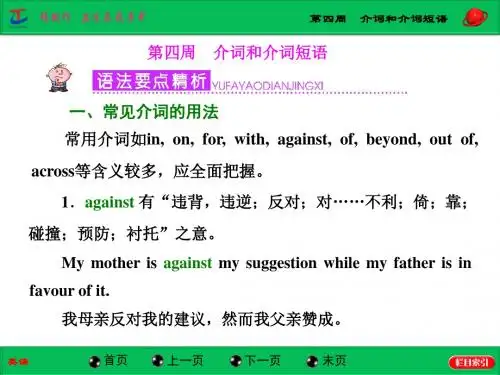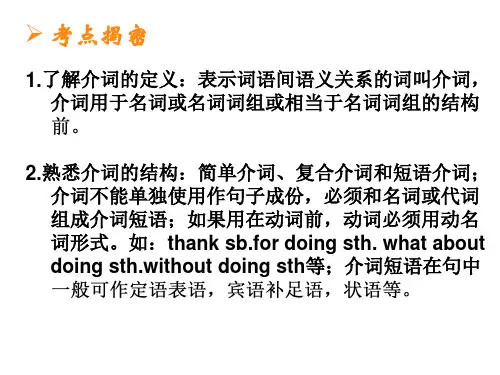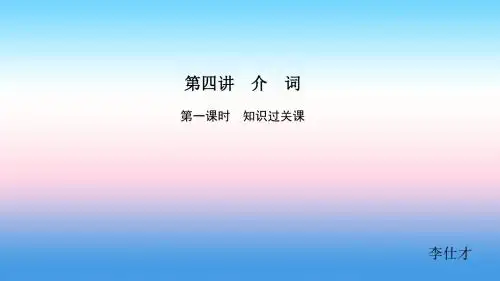高中英语 专题四 介词及介词短语课件 新人教版
【语法专项】第四周++介词和介词短语(共36张PPT)

英语
首页
上一页
下一页
末页
返回目录
专题5
正反解读介词
第四周
介词和介词短语
结束
• • • •
正 面 解 读
7.表示“用”的介词 表示具体工具的“用”,用with;而表示材料、方式、 方法、度量、单位、语言、声音等的“用”,用in。
英语
首页
上一页
下一页
末页
返回目录
专题5
正反解读介词
第四周
介词和介词短语
No one hopes that the situation between China and Japan is beyond control due to the Diaoyu Islands. 没人希望中日关系因钓鱼岛事件失控。
英语
首页
上一页
下一页
末页
第四周
介词和介词短语
结束
3 . by 可表示“程度或增减的幅度”,还可作“按; 以„„计;依据”讲。
英语
首页
上一页
下一页
末页
第四周
介词和介词短语
结束
2.beyond 可表示“范围,限度”,意为“超出,为„„所不 及”。
常用短语:beyond words/description/imagination/belief/one's reach/one's control“无法用语言形容、无法用语言描述、想象不 出来、不相信、够不着、管不了”。
英语
首录
专题5
正反解读介词
第四周
介词和介词短语
结束
• • • •
正 面 解 读
规则2:“形容词+介词”型 (1)at前的adj.:angry, good, bad, surprised, excited, puzzled等。 (2)of前的adj.:afraid, sure, certain, full, tired, fond, proud, worthy等。 (3)with前的adj.: angry, strict, busy, careful, popular, patient等。 (4)in前的adj.:strict, weak, interested, successful, rich 等。 (5)to前的adj.:polite, kind, cruel, rude, close, available 等。
高三英语介词4(PPT)5-1

1.了解介词的定义:表示词语间语义关系的词叫介词, 介词用于名词或名词词组或相当于名词词组的结构
2.熟悉介词的结构:简单介词、复合介词和短语介词; 介词不能单独使用作句子成份,必须和名词或代词 组成介词短语;如果用在动词前,动词必须用动名 词形式。如:thank sb.for doing sth. what about doing sth.without doing sth等;介词短语在句中
you will miss the early bus.[2003
A.so
B.and
C.or
【例3】 The scientist knows two languages.
He can speak______English__C____French.
[2003
A.either,or
B.neither,nor
梵呗〗。 【败】(敗)①动在战争或竞赛中失败(跟“胜”相对):战~国|立于不~之地|甲队以二比三~于乙队。②动使失败;打败(敌人或对手):
大~侵略军。③(事情)失败(跟“成”相对):功~垂成|不计成~。④毁坏;搞坏(事情):身~名裂|伤风~俗|成事不足,~事有余。⑤解除;消 除:~度|~火。⑥破;不锈钢电解抛光设备 电解铜设备 不锈钢电解抛光设备 电解铜设备 ;旧;腐烂:~絮|~肉。⑦动凋谢;枯 萎:~叶|塘里的荷花都~了。⑧动败落:好好的一个家~在他手里了。⑨动使败落:~家。 【败北】动打败仗(“北”本来是二人相背的意思,因此军队 打败仗背向敌人逃跑叫败北):身经百战,未尝~◇客队决赛中以二比三~。 【败笔】名写字写得不好的一笔;绘画中画得不好的部分;诗文中写得不好的 词句。 【败兵】ī名打了败仗的兵;打败仗溃散的兵。 【败果】名失败的苦果;失败的结局。 【败坏】①动损害;破坏(名誉、风气等):~门风|~声 誉|~纪律。②形(道德、纪律等)极坏:道德~|纪律~。 【败火】∥动中医指清热、凉血、解度等:~|绿豆汤能清心~。也说清火。 【败绩】①动原 指在战争中大败,现多指在比赛或竞争中失败:屡遭~。②名在比赛或竞争中失败的结果:多次比赛,无一~。 【败家】∥动使家业败落:由投机起家的, 也会因投机而~。 【败家子】(~儿)名不务正业、挥霍家产的子弟。现常用来比喻挥霍浪费集体或国家财产的人。 【败将】名打了败仗的将领,多用来指 较量中输的一方:手下~。 【败局】名失败的局势:~已定|挽回~。 【败军】①动使军队打败仗:~亡国。②名打了败仗的军队:~之将。 【败类】名 集体中的堕落或变节分子:无耻~|民族~。 【败露】动(隐蔽的事)被人发觉:阴谋~|事情~,无法隐瞒了。 【败落】动由盛而衰;破落;衰落:家 道~。 【败诉】动诉讼中当事人的一方受到不利的判决。 【败退】动战败而退却:节节~。 【败亡】动失败而灭亡。 【败胃】动伤害胃使胃口变坏:这东 西吃多了~。 【败象】名失败或衰败的迹象:赛程刚过半,这个队就露出了~。 【败谢】动凋谢◇青春常在,永不~。 【败兴】∥形①因遇到不如意的事而 情绪低落;扫兴:乘兴而来,~而归。②〈方〉晦气;倒霉。 【败絮】名破烂的棉絮:金玉其外,~其中(比喻外表很好,实质很糟)。 【败血症】名病, 由细菌、真菌等侵入血液而引起。症状是寒战,发热,皮肤和黏膜有出血点,脾大,严重时可出现休克。 【败叶】名干枯凋落的叶子:枯枝~。 【败因】ī 名失败的原因。 【败仗】名失利的战役或战斗:
2019人教版高中英语语法综合复习全解课件:介词和介词短语 (共76张PPT)

B. after 在……之后 Let’s sing some songs after school. (after作介词)
放学后咱们唱歌吧!
Please close the door after you leave the
room. (after作连词)
离开房间后请关门。
3. 表示期限等用by, until, till
B. until/till 直到……为止(时间) Wel/till nine o’clock.
一直到九点,我们才开始看电视。
I will wait for him until he comes here. 我将在这儿一直等到他来。
一、常用介词
1.表示年、月、日、时刻等用at, in, on
at用于表示时刻、时间的某一点。 at 注意:表示时间的名词前有 lunch 午餐时 at breakfastthis, 早餐时 last, at night at first 起初 next, 在夜间 every等修饰时,其前面不加介 at times at the same time同时 词。偶尔,有时 this morning 今天早上; We usually have lunch at noon/at twelve. last Monday 上周一; 我们通常中午吃午饭 (十二点吃午饭)。 every week 每周。
考点题例一
for 1. The meeting lasted _____three hours yesterday. 2. During/Over __________ the past 10 years, great changes have taken place in this area. by 3. We’ll have finished the work _____ ten o’clock tomorrow. 4. The sunlight came in through ______(穿过) the windows in the roof and lit up the whole room.
高中英语语法专题四 介词和介词短语 共89张PPT

早于;在…之前 先后顺序,与一般
completed
before
the
end
时连用
of the year.
By 强调已完 成,与完
1在.表(示某“时不)迟前于”….,All of you are to arrive at 2.表示“在….期间,school by seven o’clock.
成时连用 在…时间内”
From then on she knew she would win.
I lost my money and I have been worried since then.
The meeting lasted for three hours yesterday.
介词
During 在…期 间
during over through
over 在…期间;贯穿(一段时 We had a
间);与during同义
pleasant chat
over a cup of tea.
during over through填空
Let’s discuss it over lunch. During/ Ovtheer past 10 years, great changes have
连接时
and Italy
强调每两者之间的关系 the difference between
the three of them
between 表示“由于…合作的结果” Between them they
时
landed the fish.
在share, divide等表示分享之类的动 He divided his money
专题四 介词与介词短语
2019高考英语基础保分篇第四讲介词课件新人教版

his technology. In[18] return, he was awarded many international awards for his great
achievements. In his spare time, Dr. Yuan loves playing the violin and listening to music. Every night,he reads for[19] half an hour about[20] various topics before he goes to sleep. But he cares for nothing more than his research and he goes to the fields twice a day by[21] motorbike, which has left a strong impression on[22] us.
1 . in 地点介词,在某个城市、国家等范围较大的地点前用 in ;小地点,如 station ,
airport,corner等前面常用at。
2.从某所学校毕业用graduated from。 3.年、月前用in。 4.since“自„„以后,从„„以来”,表示某情况自过去某时间点或某个事件以来 一直持续到现在,谓语动词通常使用完成时。
12.as表示“作为”。
13.after表示“在„„之后”。 14.词组without any hesitation表示“毫不犹豫地”。
15.besides表示“除了„„外,还”。 16.benefit from表示“从„„中受益”。 17.access后常接介词to构成词组access to表示“可获得/利用某物或到达某地”。 18.in return,表示“反过来,作为报答”。 19.for表示某事持续了一段时间。 20.about关于;在„„方面。
高中英语语法:介词和介词短语(共43张PPT)精品公开课优质资源

off从…离开
Stars look quite bright against the dark blue sky.在深蓝色天空的映
衬下,星星看起来格外明亮。
一、介词的分类
1.根据介词的构成分类 (1)简单介词 简单介词指的是由一个单词构成的介词。 The House is beyond the bridge.
英尺的低空飞行。
On a cold evening it is pleasant to sit by the fire.在寒冷的夜晚,坐
在火炉旁很舒服。
(3)表示方式的介词
by借助于
in用
with用
They decided to raise the money by subscription.他们决定采取募捐
二、介词的宾语
3.介词短语 He found his lost pen from under the desk.他从桌子底下找到了丢失 的钢笔。 4.动词不定式或动名词 We had no choice but to wait the result.除了等待结果我们别无选择。 5.名词性从句 I had no idea of what he wanted.我不知道他想要什么。 I accepted nothing except what was due to me.除了我应得的,我并 未接受任何东西。
我们会有一次愉快的旅行。
I don’t like a house without a bathroom.我不喜欢没有浴室的房子。
(6)表示让步的介词
in spite of尽管
despite尽管
for all尽管
with all尽管、不顾
Despite the fact that she is short, she is an excellent basketball player.
2021高考英语一轮复习第二编专题一第4讲介词短语课件新人教版
考点透析
2021/4/17
2021高考英语一轮复习第
12
考点 1 介词的用法 一 介词的句法功能 介词不能独立在句中充当成分,通常与名词、代词或动名词构成介词短 语在句中充当语法成分。 1.作定语 And it was all because he happened to be the last kid in the last row. 这一切都因为他碰巧是坐在最后一排的最后一个孩子。
2.作状语 介词短语经常用来作状语,表时间、地点、原因、方式等。 Also imagine what it would be like spending the rest of your life with your eyes closed. 也要想象闭着眼睛度过余生会是什么样子。 3.作表语 He had no food or water and he was in terrible pain. 他没有东西吃,也没有水喝,而且疼得厉害。
答案:in in 在此表示某方面。
4.(2016·全国卷Ⅱ)Most of us are more focused ________ our tasks in the morning than we are later in the day.
答案:on focus on “注意,集中”,为固定短语。
三 其他高考常考介词的用法 1.介词 at 可表示动作、感情的原因,意思是“因……而;一听到(看 到/想到)……就……” At the boy's remark, the bookseller looked at him curiously. 听到男孩的那句话,卖书人好奇地看着他。 2.“on+名词或动名词”结构可表示“一……就……” On his arrival he went straight to the counter and spoke to the clerk in uniform behind it. 他一到达就径直往柜台走去,并与柜台后边穿制服的店员说话。
高考英语一轮复习专题课件:专题4介词和介词短语(人教版)
介词一、表示时间的介词1.at,in,on,byat①表示时间点、时刻等。
at10:00,at noon,at midnight,at sunrise②表示较短暂的一段时间或被认为是标志大事的节日。
at Christmasin①用于世纪、朝代、年代、月、季节或泛指上午、下午、傍晚等一段时间的名词前。
in the1990s,in the Tang Dynasty,in October,in spring,in the morning②表示在一段时间之后。
I'll be back in three hours.我将在三小时之后回来。
on表示具体的某-天或某天的上午、下午、晚上等。
on September2nd,on a sunny day,on the morning of May1st by①表示“不迟于,在……前”。
The meeting should have finished by4:30.会议本来应该在4:30之前结束。
②表示“在……期间,在……时间内”。
He worked by day and slept by night.他白天工作,夜里睡觉。
【温馨提示】当名词前有this,that,last,next every,each,some等词修饰时,通常不用任何介词。
this morning今天上午,last year去年(1)汉译英①在妇女节________________②在20世纪80年代__________________③在一个下雪的夜晚________________④在清朝___________________on Women's Day in the 1980s/1980's on a snowy night in the Qing Dynasty2.in,after的用法in和after后都可以接时间段,表示“在……之后”,但in 常与将来时连用,after常与过去时连用。
人教高三英语一轮复习课件高考语法通关(4)介词和介词短语
■四、介词和介词短语//〃// ///〃/■介词主要考查近义词的用法区别、介词的特定含义、介词和连词易混淆的项目、介词的固定用法等,不仅在单项填空中进行考查,在短文改错题中,对于介词的有无、介词与其他词的固定搭配的考查尤为频繁。
因为介词的用法非常普遍,它关系到句子的上下衔接,所以以后的高考题介词仍然是一个考备热点。
■高考研究介词是英语中比较活跃的词,中学阶段所学的介词有40多个。
它与名词、形容词、副词和动词等构成搭配时用法灵;活,意义丰富。
搭配比较活跃的介词主要;有in, out, up, down, on, off, to, from,for, over, with等。
预测今后高考介词的考查将以介词的固定短语和介词辨析为主O在学习介词时,应重点掌握介词的基本用法,同时注意总结其与名词、形容词、副词、动词等搭配构成的短语的意思和用法。
江苏的高考中通常在单选中、完型中〃〃/7 //////■考点一常用介词的用法■ 1.介词at可表示动作、感情的原因,意思是“因……而;一听到(看到/想到)……就”■ Why was the boy surprised at the writer's request?-那男孩为什么对作者的请求感到吃惊?■2. on +名词或e.ing形式可表示“一...... 就O■On his arrival at the hotel he went straight to the counter and spoke to the clerk in uniform behind it.碁一到饭店,他就径直往柜台走去,并与柜台后边穿制服的店员说话。
■On arriving home, I discovered they had gone・■我一到家就发现他们已经离开了。
3. to 与情感名词连用,表示“ 使人产生的感觉”。
状语,位置前、中后皆可。
为了强调,可在前面加much 。
最新5.-介词和介词短语(共20张PPT)教学讲义PPT
语法互动(五)┃介词和介词短语
中考要求 1.熟练掌握常用介词的基本用法(表示时间、地点、位置、
方式等)。如:in, on, at, of, to, from, by, with, for, about, after, before等。 2.理解其他介词的一般用法。
语法互动(五)┃介词和介词短语
3.across/through (1)across强调从表面穿过。 Go __a_c_r_o_s_s__ the bridge, and you will find the park. 穿过这座桥,你就会找到公园。 (2)through强调从一定的空间内穿过。 The river runs _t_h_ro_u__g_h_ the city. 这条河流经这座城市。 4.over/above (1)over强调在某一物体的正上方,其反义词为under。 There is a bridge ___o_v_er___ the river. 河上有座桥。 (2)above强调在上方,但不一定是正上方,其反义词为below。 The average temperature here in summer is well ___a_b_o_v_e__ 30℃. 这里夏天的平均温度远远超过30℃。
语法互动(五)┃介词和介词短语 考点三 常见介词的用法
语法互动(五)┃介词和介词短语
We won our match __a_g_a_in_s_t_ that team. 我们在比赛中赢了那个队。 The desk is __a_g_a_in_s_t__ the wall. 书桌靠墙放着。 I go to school ___b_y____ bus. 我乘坐公共汽车去上学。 Do you go ____b_y____ that supermarket? 你路过那家超市吗? The students are examined one ___b_y____ one. 学生们一个挨一个地接受检查。
- 1、下载文档前请自行甄别文档内容的完整性,平台不提供额外的编辑、内容补充、找答案等附加服务。
- 2、"仅部分预览"的文档,不可在线预览部分如存在完整性等问题,可反馈申请退款(可完整预览的文档不适用该条件!)。
- 3、如文档侵犯您的权益,请联系客服反馈,我们会尽快为您处理(人工客服工作时间:9:00-18:30)。
(3)near,beside,by beside和near都有“靠近”的意思,beside强调“在……旁边 (=at the side of)”,指两者的位置关系,多用于人;near意为 “在……附近(=at a short distance from)”,表示两者之间的距 离,多用于场所,另外near还可表示时间或程度等。by表示 “在……旁边”时含有“倚,凭,靠,沿着”等意。
on October 1st,on a rainy day,on National Day,on the morning of January 3rd,on the afternoon of his arrival
in:用在某年、月、季节、上午、下午、晚上等的时间名词 以及较长的时间如世纪、朝代之前。
There are prosperous towns and villages along the railway. 铁路沿线有许多繁荣的村镇。 The lake was frozen,so they could go across the ice. 湖水结冰了,所以他们能够从冰上穿过。 They hoped to walk through the forest before sunset. 他们希望在日落之前穿过森林。 She went by the library on her way to the station yesterday. 昨天她在去车站的路上经过了图书馆。
(4)about,round,around 表示“在……周围”时,about指的是“靠近……周围”,不 表示“把……团团围住”,而round和around指“完全的、封闭 的周围”,round既可表示静态位置,也可表示动态的动作, around通常表示静态的位置。 The students sat about the desk.(泛指在附近) The students sat round/around the desk.(强调围桌而坐,指静 态) They walked round the lake. 他们绕着湖走。(指动态)
in the Tang Dynasty,in September,in the morning/afternoon/evening
注意 当时间名词前有this,that,last,next,some,every 等词限定时,通常不用任何介词。
(2)for,during,through for:指某个动作或状态持续了多少时间。 He has been in Shanghai for two days. 他在上海两天了。 during:指某个动作或状态在某个时间段里或整个过程中断 断续续地发生过多次,或在整个时间段里的某一点发生过,起止 时间比较明显。
2.表示“动向,位置”的介词
(1)on,above,over和below,under,beneath ①on,above,over皆可表示“在……之上”。区别是on表示 与表面接触的上方;above表示“在……上方,高于”,但不垂 直,表面不接触;over表示正上方,强调“垂直在……之上”, 如果over指上下接触,则含有部分或全部覆盖之意,还可表示动 作在某物体的上方进行,意为“越过,通过”。
(5)after,in,within after:后接时间段表示过去“一段时间之后”,与一般过去 时态连用;后接时间点表示“某一时刻之后”,与将来时态连 用。 After supper we went to see a film. 晚饭后我们去看了一场电影。 I'll go to see him after five o'clock. 五点以后我要去看他。
(3)from,since from:只用作介词,表示某动作或情况自某时开始,不表示什 么时候结束。 She studied the piano from the age of three. 她从三岁开始学钢琴。
since:既可用作介词,也可用作连词,常表示某动作或情况 自某时开始,一直持续到说话时刻。
②across可以表示“在……对面或另一边”,相当于 opposite。
She lives just across the street. 她就住在街的对面。 ③在表示“架空”的意思时,across强调“横过”,over侧重 “屹立”。 There is a bridge across the river.(桥与河交叉成十字形) There is a bridge over the river.(桥屹立于河面之上)
Far beneath/below the mountain was a sea of forest.(表示不垂 直的下方)
The car was buried beneath the dry leaves.(含有上下接触之 意)
(2)in front of,in the front of 两个介词短语皆有“在前面”的意思,区别是in front of通常 相对于某物体的外部来说,指某人或某物位于该物前面,意为 “在……前面”;in the front of通常相对于空间而言,指某人或 某物位于某个空间的内部,意为“在……的前部”。 There are some trees in front of the house.(树在房子外部的前 面) The teacher is standing in the front of the classroom.(老师站 在教室里的前面)
due to:引出造成后果的原因,在句中作表语、状语和定语。 作表语和状语时与owing to同义,作状语时,一般不用逗号与其他 成分隔开。
The team's success was largely due to her efforts. 该队的成”或将来“一段时间之后”, 与将来时态连用。
My father will be back from abroad in three days. 三天后,我的父亲就会从国外回来。 within:指“在……之内”,强调事情发生的全过程不超过 某一段时间。 He promised that the roof should be repaired within two days. 他答应两天之内就把屋顶修好。
②表示“在……期间,在……时间内”。 He worked by night and slept by day. 他晚上工作,白天睡觉。 until:是比较正式的用法。在肯定句中和持续性动词连用, 表示动作一直持续到until后面的时间为止;在否定句中和瞬间性 动词连用,表示该动作直到until后面的时间才开始。
3.表示“原因,理由”的介词 常见的有for,because of,owing to,due to,on account of, thanks to,out of等。 for:多与表示感情的抽象名词或动词及reason,famous等词 连用。 I must apologize for calling you too late. 很抱歉我这么晚给你打电话。 because of:意为“由于,因为”,强调因果关系,在句中仅 作状语,修饰句中的一部分,与其他成分不用逗号隔开。
I've been here since three o'clock,but nobody came yet. 我从三点起一直在这儿,但没有人来过。 He has known her since he lived in this street. 自从他住到这条街上以来,他就认识她。
(4)before,by,until,till before:早于;在……之前 The new road will be completed before the end of the year. 这条新道路将在年底以前建成。 by:①表示“不迟于……,在(某时)前”。 We'll have finished the work by ten o'clock tomorrow. 我们将在明天十点之前完成工作。
He sat down beside Emma. 他在艾玛身旁坐下。 The bus stop is near our school. 车站在我们学校附近。 It was near midnight when they arrived. 他们到这里时将近午夜了。 There is a small house by the river. 河边有一幢小房子。
He didn't go to work because of his illness. 由于生病他没去上班。 owing to:与because of一样,也强调因果关系,除作状语 外,也可作表语。作状语修饰整个句子,可放在句首或句末,用 逗号隔开。 They decided to postpone the trip,owing to the change of the weather. 由于天气变化,他们决定推迟旅行。
②below,under,beneath皆可表示“在……之下”。below 表示不垂直并与表面不接触的下方;under表示垂直并与表面不接 触的下方;beneath表示在某物之下,可以表示垂直或不垂直,也 可以表示上下接触的意思。
He put the book on the desk.(表面接触的上方) There are many apples hanging above me.(不垂直,表面不接 触) A big apple hangs over me.(正上方,强调垂直)
语法部分
专题四 介词及介词短语
说基础
课前预习读教材
SHUO JI CHU 考/点/梳/理
必备清单 1 核心介词用法解析 1.表示“时间”的介词 (1)at,on,in at:用在钟点、黎明、正午、黄昏、午夜、节日等时间名词 前或表示一段时间的开头或结尾。 at 12:00,at noon,at night,at midnight,at dawn,at daybreak,at sunrise,at the weekend,at Christmas on:用在具体的某一天、星期几及某一天的上午、下午、晚 上等的时间名词前,即on表示具体的时间。
